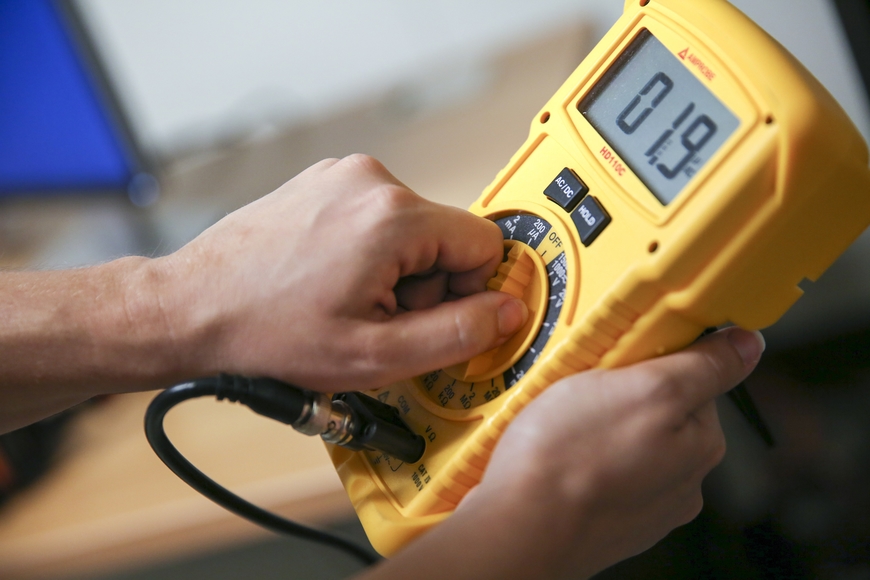Facilities, Instruments & Sensors

AISOS: Advanced Imaging Service for Objects and Space
The Advanced Imaging Service for Objects and Spaces (AISOS) is a dedicated facility for macro- and meso-scale imaging of objects in two and three dimensions. It houses advanced technology for exploring objects and artifacts with new levels of precision. AISOS is a joint project between the Department of Anthropology, researchers from departments across campus, and Liberal Arts Technologies and Innovation Services (LATIS) in the College of Liberal Arts.
Center for Applied & Translational Sensory Science (CATSS)
The Center for Applied and Translational Sensory Science (CATSS) is an interdisciplinary enterprise focused on enhancing the capability and well-being of persons with sensory loss. Specifically, it translates fundamental scientific research into functional and accessible devices and therapies that can maximize quality of life for those with auditory and visual loss. The vision of CATSS is to harness the University of Minnesota's world-leading scientific expertise in sensory science to tackle the problems faced by millions of people with sensory deficits, such as low vision or hearing loss.
Center for Magnetic Resonance Research
The Center for Magnetic Resonance Research (CMRR) focuses on the development of unique magnetic resonance (MR) imaging and spectroscopy methodologies and instrumentation for the acquisition of structural, functional, and biochemical information non-invasively in humans, and utilizing this capability to investigate organ function in health and disease.
Data Repository for U of M
The Data Repository for U of M (DRUM) is a publicly available collection of digital research data generated by U of M researchers, students, and staff. Anyone can search and download the data housed in the repository, instantly or by request.
EEG Facility
The Interdepartmental EEG Facility has an Advanced Neuro Technology 128-channel asalab electroencephalography system. The lab is equipped with two 64-channel amplifiers and a selection of 128-electrode caps; researchers have the option of acquiring 64-channel data from two subjects simultaneously or high-density EEG data from a single subject with 128 channels.
LATIS Research Services
The Liberal Arts Technologies and Innovation Services (LATIS) provides consultative services to researchers in the College of Liberal Arts and across the University. This service consults on quantitative and qualitative research design, programs surveys and experiments, and assists with data management and analysis needs. Contact latisresearch@umn.edu to learn more about LATIS Research Services and other consultative services for research methodology.
Minnesota Supercomputing Institute
The Minnesota Supercomputing Institute has the software, hardware, and experts to provide the support you need for your research no matter what the research area. Expert services are available from defining research objects to developing custom applications.
Office of Management Services
The Office of Measurement Services (OMS) has been in the business of data collection, processing, analysis and reporting for over 85 years. OMS specializes in survey services, exams, Student Rating of Teaching (SRT), and the Minnesota Statewide Testing Program (MSTP).
Social and Behavioral Sciences Laboratory (SBSL)
The Social and Behavioral Sciences Laboratory (SBSL) is a high-capacity managed research lab for collecting participant data for in-person studies. The SBSL consists of separate waiting and instruction rooms, privacy carrels around all computers, and technology that supports precision timing/display tasks and online group interaction experiences. For more information and to schedule time in the SBSL, please email latisresearch@umn.edu.
Social Sciences Cluster Computing (compute.cla)
Our 400-core Linux cluster computing environment, known as compute.cla, provides a responsive and convenient environment for social science researchers to develop and run computational tasks that don't require the resources provided by the Minnesota Supercomputing Institute. This small cluster is specifically tailored to the needs of liberal arts researchers.
Usability Lab
The Usability Lab at the University of Minnesota is built to adapt to many uses. The soundproof observer room is larger than most, and the space includes a one-way mirror so your team can sit in comfort while you watch participants use your product. Displays on the wall and along the console provide high-definition views of the participant’s screen, facial expressions, keyboard and mouse activity, and mobile devices. A variety of camera angle combinations along with audio are recorded to DVD and .mp4 format.